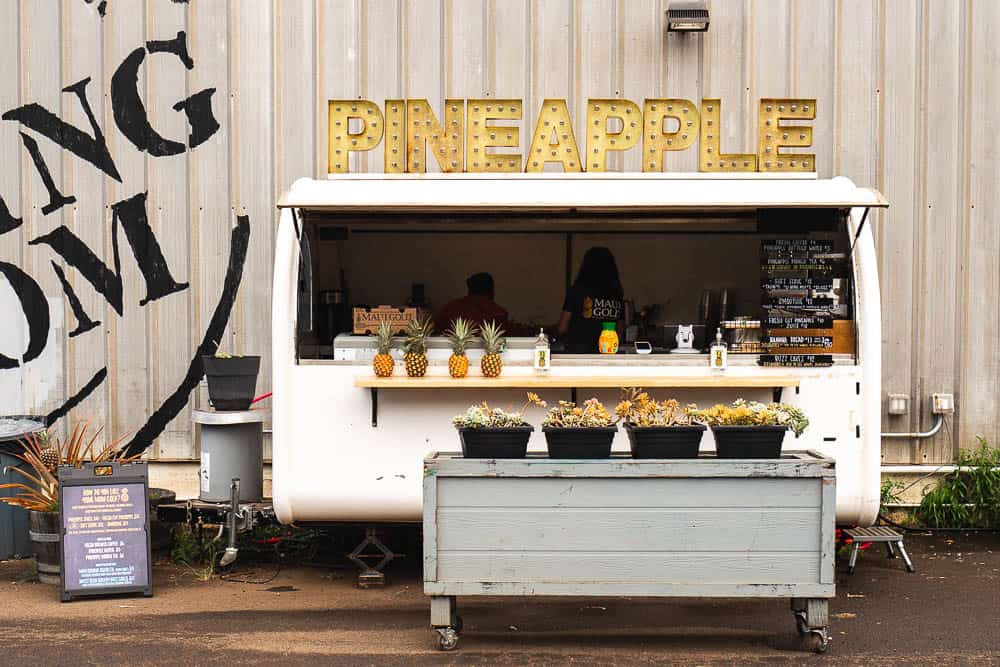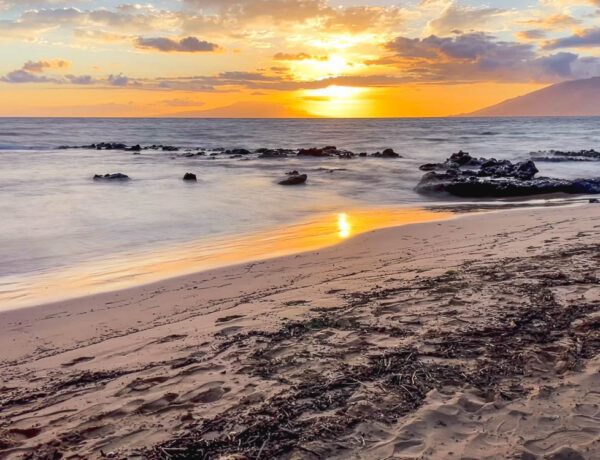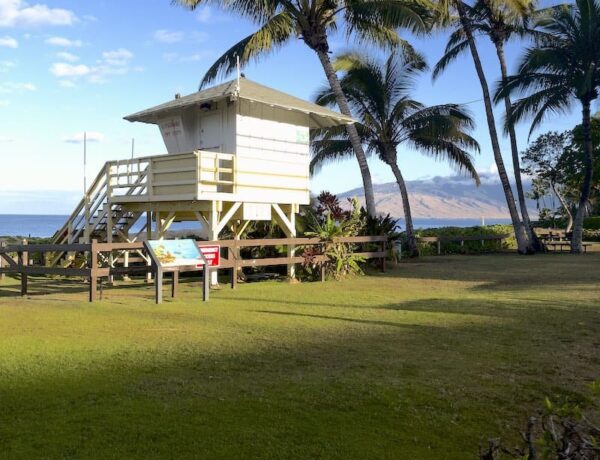Sponsored post: We were provided two complimentary tickets to the Maui Gold Pineapple Farm Tour in order to share our experience with you. As always, opinions are entirely our own.
I always say that you haven’t tasted a pineapple until you’ve bitten into the flesh of a Maui Gold pineapple. Hand-picked at the peak of ripeness, Maui Gold pineapples taste decadently sweet — no worry of the loathsome acidic sour tongue you get with other pineapple varieties.
If you’re visiting Maui, consider going directly to the pineapple’s source with an Upcountry farm tour and tasting session of this quintessential Hawaii fruit.
Maui Gold’s pineapple farm tour offers island visitors a glimpse into Hawaii’s agricultural history — one of the area’s most productive exports during the 1900s — that’s unlike any other tour in the state. That’s because the Maui Gold farm endures as the last active remnant of Hawaii’s commercial pineapple industry.
We were invited to a complimentary tour of Maui Gold’s farm and sorting facility. Keep reading to find out what it was like — and our honest thoughts about the experience.
| Maui Pineapple Farm Tour details (2023) Cost: $75 (13+ years), $65 (3-12 years) Tour duration: 1.5 hours Max group size: 24 |
Ready to book your tour? Click here to book Maui Gold’s Hali’imaile Pineapple Farm Tour.
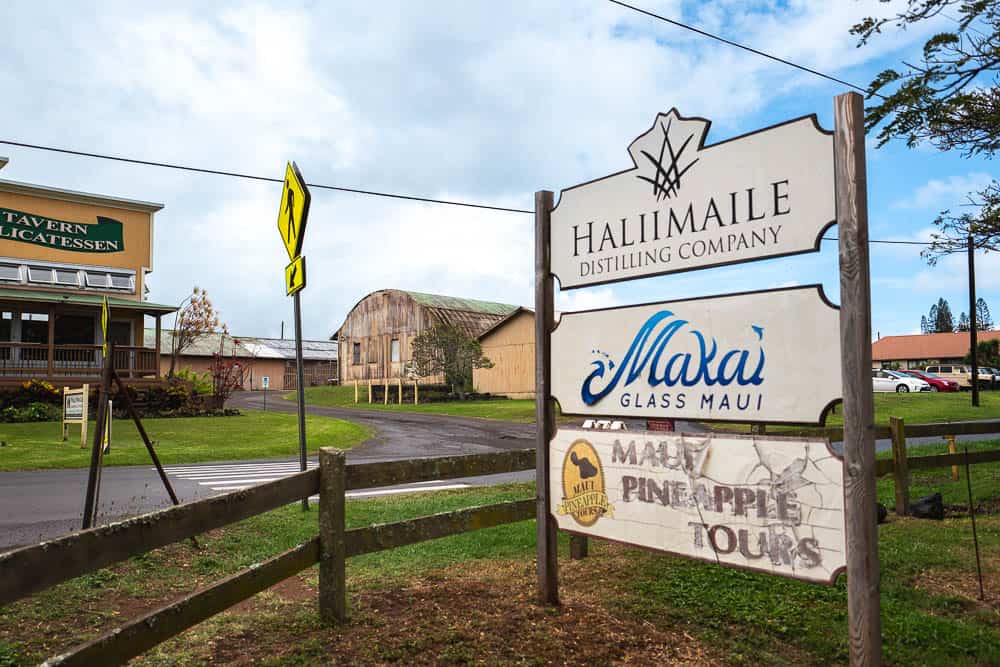
WHAT WE ENJOYED
- A glimpse into the world of what was once a top Hawaii export (next to sugar)
- Pineapple tasting in the field, along with a fruit cutting demonstration
- Free boxed pineapples to take home (one per person)
GOOD TO KNOW
- The majority of the tour takes place on an air-conditioned bus, with two stops in the field and one stop at the factory
- Depending on your tour date, you may or may not observe production activity at the Maui Gold pineapple plant
- The pineapple tour isn’t wheelchair accessible
- Participants must be at least 3 years of age
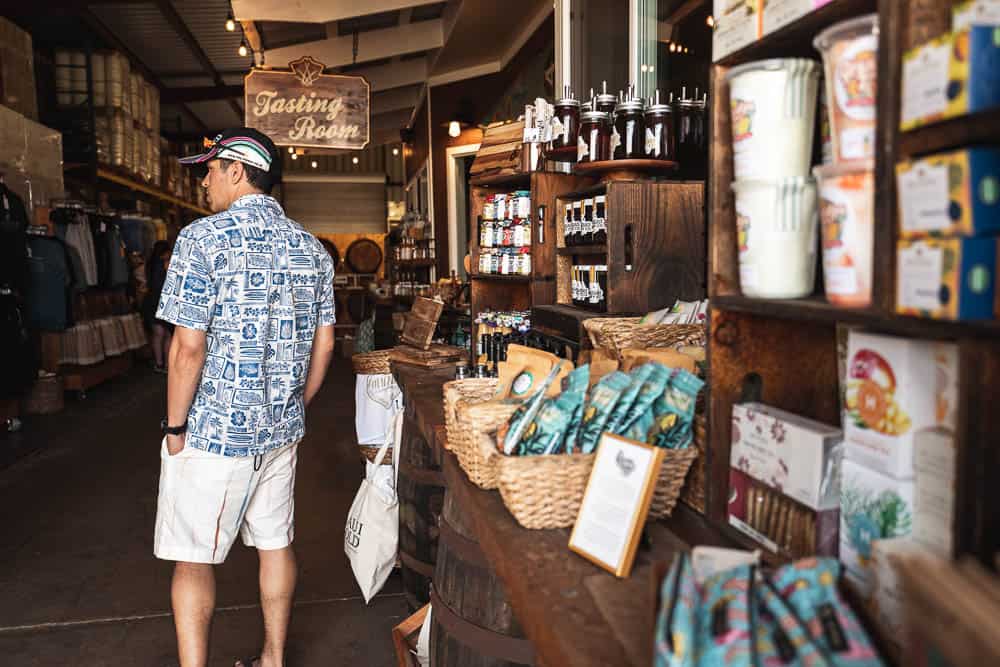
About pineapples and Hawaii
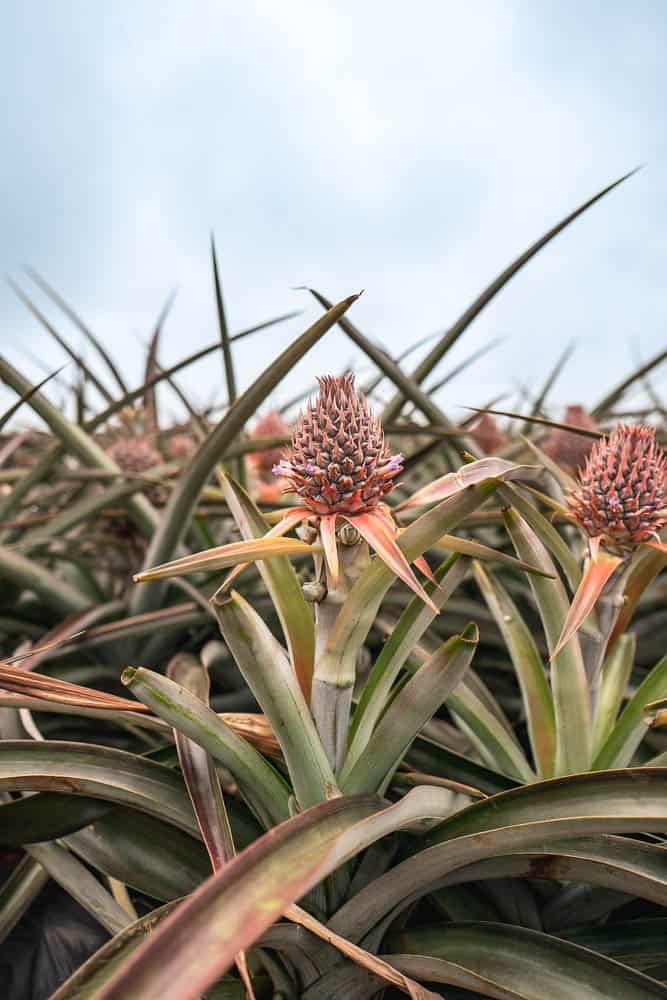
Pineapples serve as a symbol of welcome and hospitality — Hawaii’s iconic aloha spirit incarnated in fruit form, if you will. And despite the fact that most commercial growers have long since moved pineapple production to other, less costly, regions of the world, the sweet and spiky fruit remains inextricably linked to the islands of Hawaii.
About Maui Gold
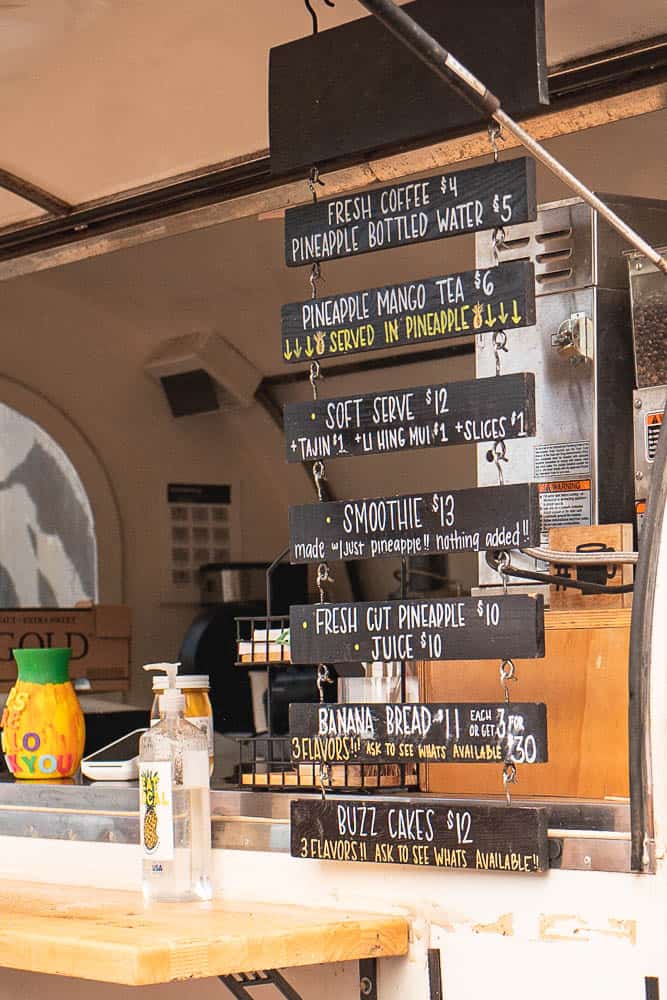
Maui Gold refers to the trademarked pineapple brand of red smooth cayenne pineapples grown by Haliimaile Pineapple Company, Ltd. First discovered in 1973, this variety of pineapple distinguished itself with its high sugar content and low acidity. The combination made it perfect for fresh pineapple cultivation — a departure from the canned variety that dominated Hawaii’s pineapple industry in the early and mid-1900s.
When century-old Maui Land & Pineapple, Inc. shut down its Hawaii pineapple operation in 2009, it seemed like the pineapple industry (and Maui Gold) would become a part of Hawaii’s history — not its present.
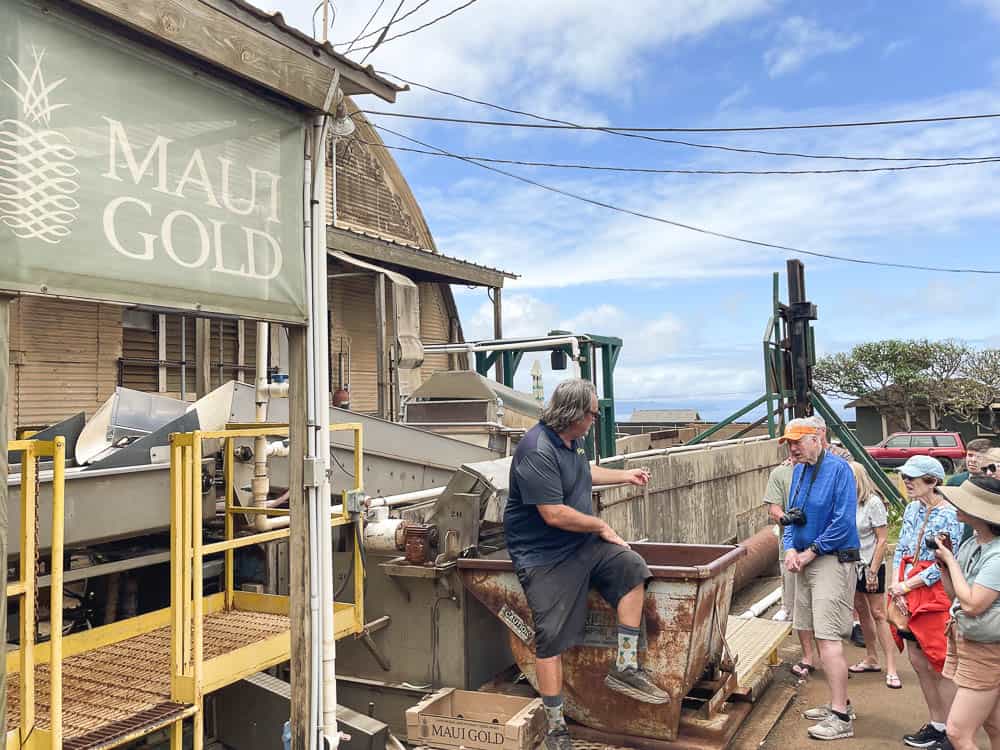
That is, until former executives from both Maui Pineapple Company and Maui Land & Pineapple, along with other investors and principals, formed the Haliimaile Pineapple Company. Their objective: to continue the tradition of farming and harvesting the iconic fruit on Maui.
Today, Maui Gold pineapples are grown on only a small fraction of land that was once allocated for pineapple fields. The company grows its pineapples on 750 acres, compared to what was once 82,000 acres of pineapple fields.
Remarkably, it takes only 16 employees to harvest nearly 2 million pineapples each year — and just 6 employees to plant the pineapple plants.
According to our Maui Gold tour guide, Maui Gold pineapples are sold wholesale only to Maui County retailers (as of 2021). The result: you’ll only find the delectable fruit in stores locally when you’re on the island. You won’t even find Maui Gold at stores on Oahu.
But Maui Gold enthusiasts can breathe a sigh of relief. You can get these uber-sweet pineapples shipped directly to your door. Maui Gold’s online store offers both one-time and subscription offerings of their coveted pineapples.
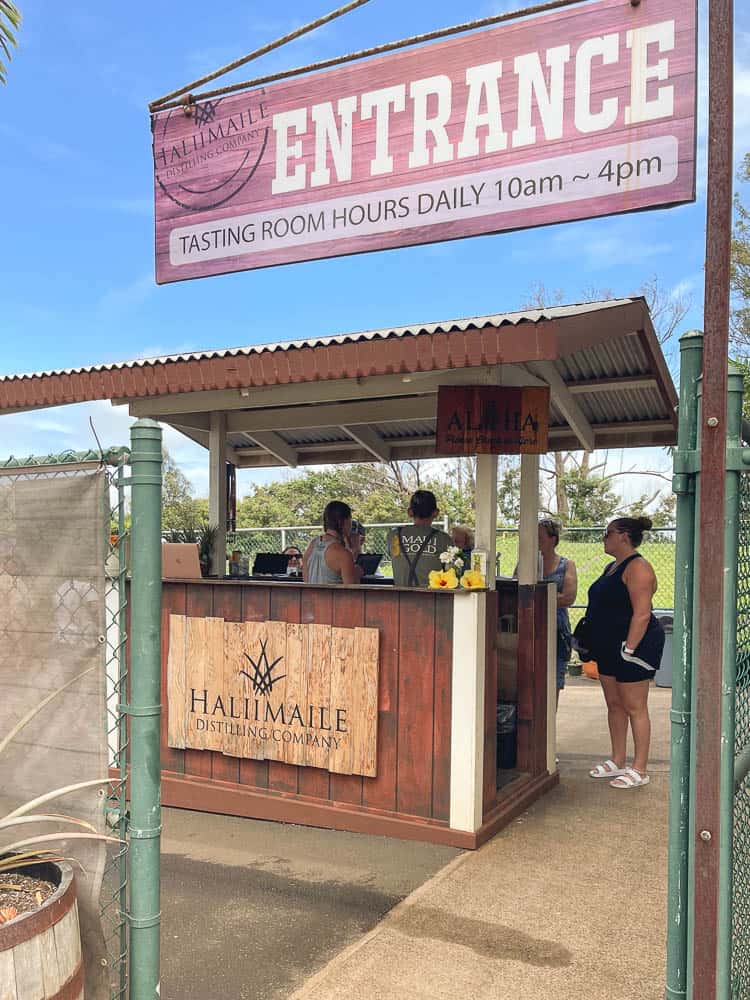
What to expect during the Maui Gold Pineapple Tour
Our tour had distinct tour sections: the pineapple field tour from the Maui Gold tour bus, two stops in the field that included a pineapple tasting, and a final stop at the factory before heading back to the check-in area.
Tour check in
We received an email from Maui Gold prior to the tour with tour instructions, and we were asked to check in 15 minutes prior to our scheduled tour.
Finding the check-in area was easy. We immediately spotted the Maui Gold banner on the fence, next to the Hali’imaile Distilling Company tasting room. At the entrance desk, we presented our tickets (which I had saved to my phone from the booking email). The tour company had also emailed us an online liability waiver, which we filled out in advance. I noticed that not everyone had e-signed their liability form prior to arrival. However, those that hadn’t were able to complete the form on provided tablets.
There were two separate tour groups departing at the same time, and we were handed a card letting us know to board bus number two.
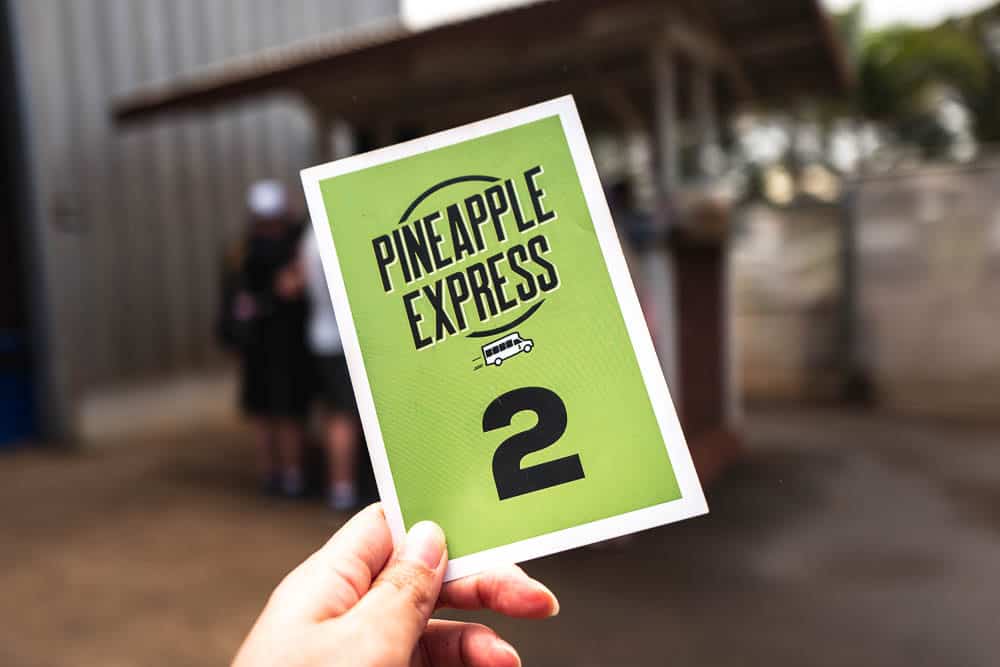
After we checked in, we perused the gift shop and pineapple trailer selling pineapple sundries such as pineapple mango tea and pineapple soft serve.
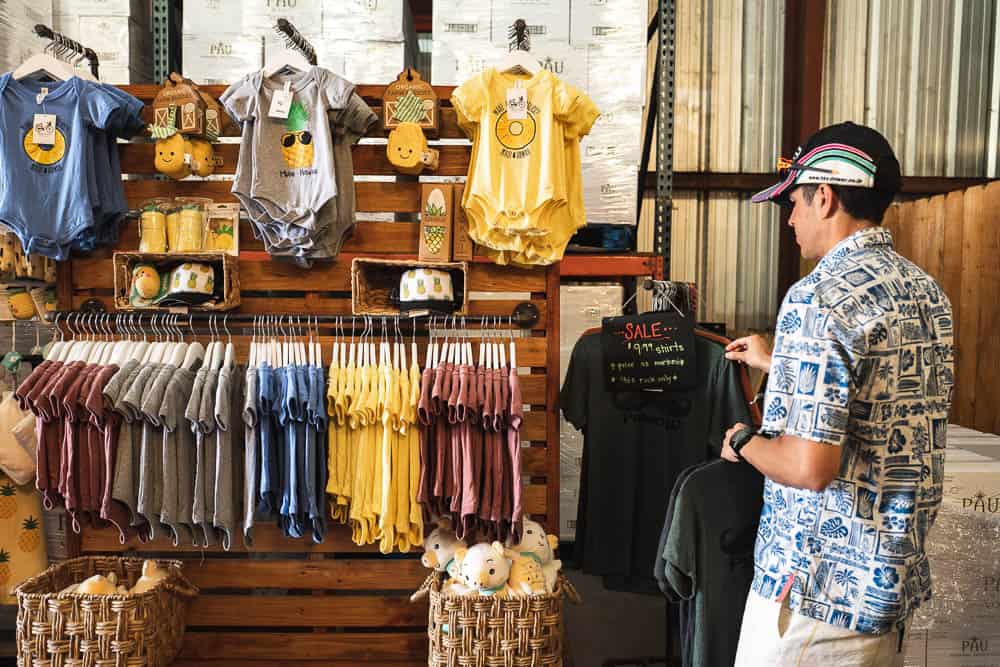
Bus ride to the Maui Gold pineapple fields
At tour time, two buses drove up in front of the check-in area. We were instructed to board our designated bus. Our tour was completely sold out, and 24 of us loaded onto Pineapple Express bus #2.
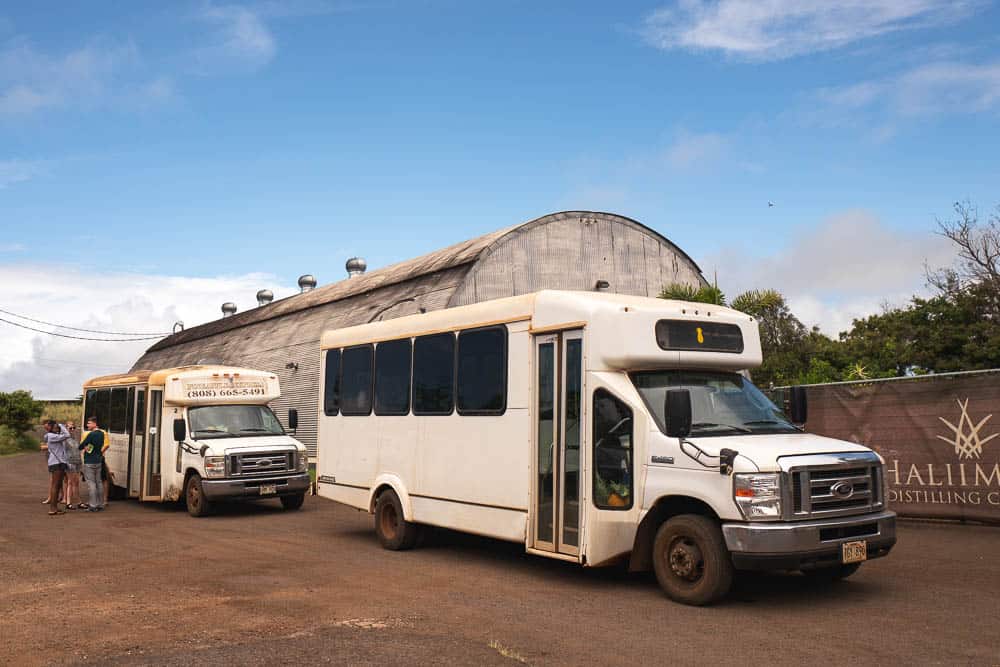
Our guide then introduced himself and let us know what to expect for the duration of the pineapple farm tour.
Side note: We caught one blunder in our guide’s opening message. He mentioned that we could only bring pineapples home to the mainland if they are in the distinctive Maui Gold pineapple box. This is a common fallacy. According to the USDA, you may transport ANY fresh pineapple with you to the U.S. mainland — not just boxed Maui Gold pineapples.
We regularly stop at the Kahului Costco to grab a few pineapples before we fly home. (They carry both Maui Gold and Dole pineapples at Costco — and the price is excellent!) Just be sure to declare your pineapples (along with any other agricultural products) when you pass through USDA inspection at the airport.
Back to the tour: The journey to the pineapple field was a short one. The bus navigated its way across the street, past stable buildings that once housed the farm’s horses that transported sacks of pineapples.
Shortly thereafter, we passed the gates to the pineapple fields.
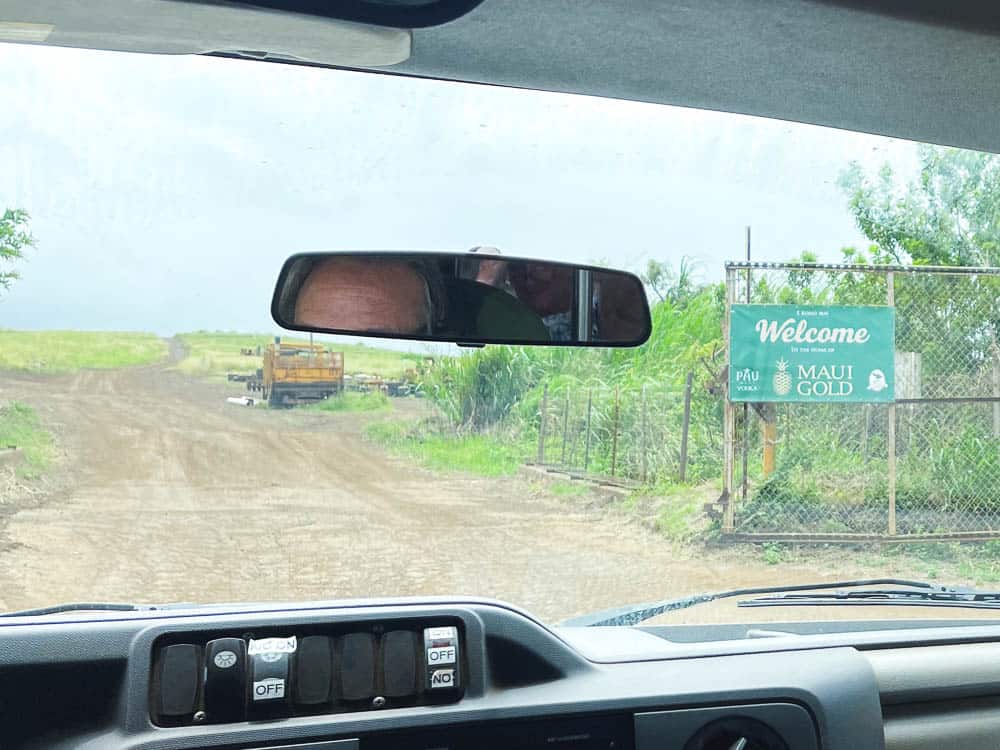
As the bus rumbled onto the dirt road, our guide pointed out points of interest, including transport vehicles and freight crates. Along the way, our guide kept us entertained with jokes, anecdotes, and facts about farming pineapples.
Making our way through the field, we spotted a sea of baby pineapples — 10-month old pineapple plants topped with the cutest little pineapples.
First stop: baby pineapples
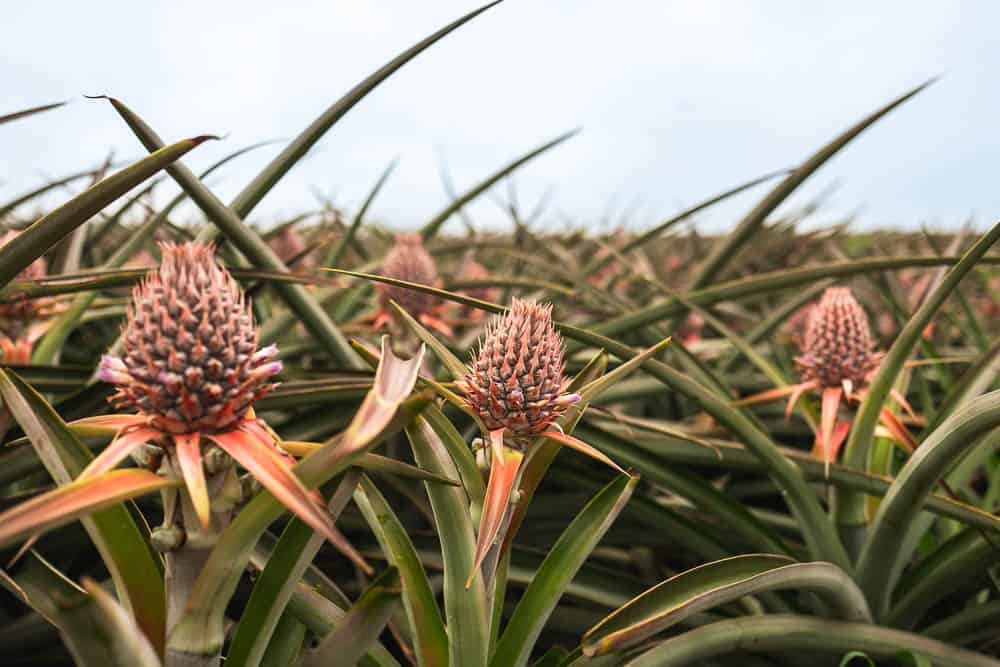
At this point in the tour, our group stepped off the tour bus and onto the Maui Gold fields. We got a close-up view of the plants and were invited to touch the fledgling fruit. This stop was also a good opportunity to ask our guide questions.
After this brief break off the bus, our group re-boarded the vehicle to continue our tour of the fields.
Second stop: pineapple tasting
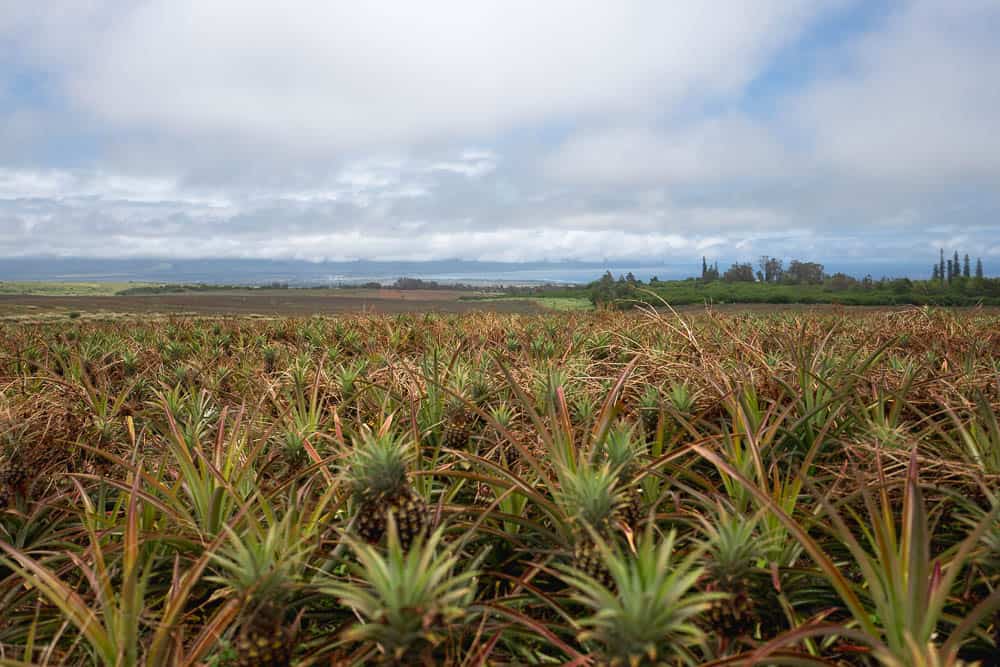
We stopped a second time in the pineapple fields for the treat we’d been waiting for — freshly cut pineapple! First, our group admired the sweeping vista view. From where we stood, we could see all the way to the ocean. Our guide kindly offered to take pictures of us (soon after the tour, I received a link to the photos via text).
Then we gathered into a circle for the pineapple pineapple tasting. Our guide brought three pineapples, and we each tasted a chunk from each one to compare the sweetness and flavor profile.
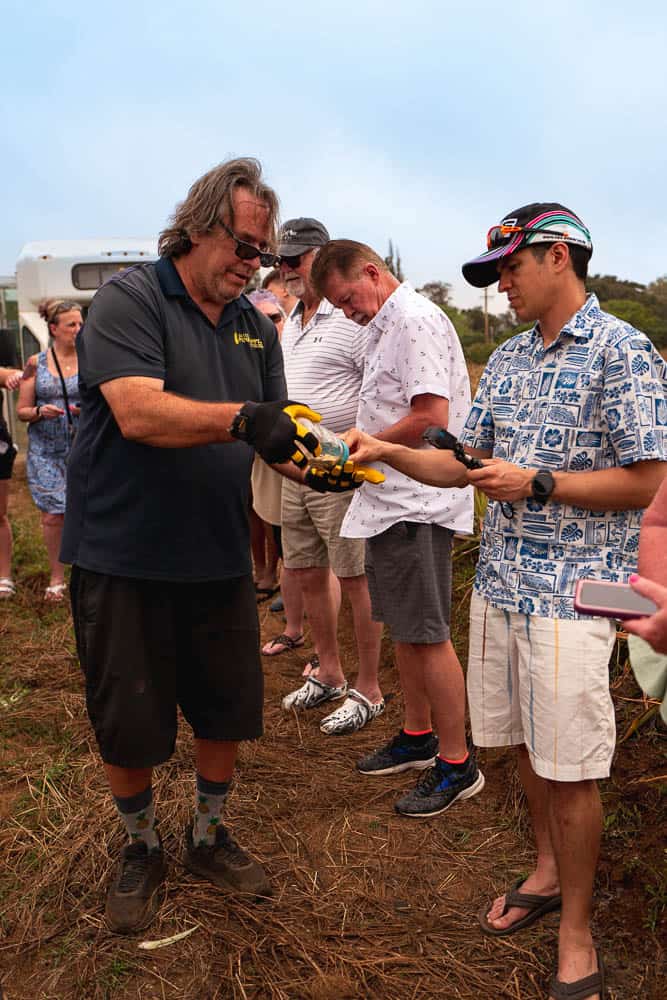
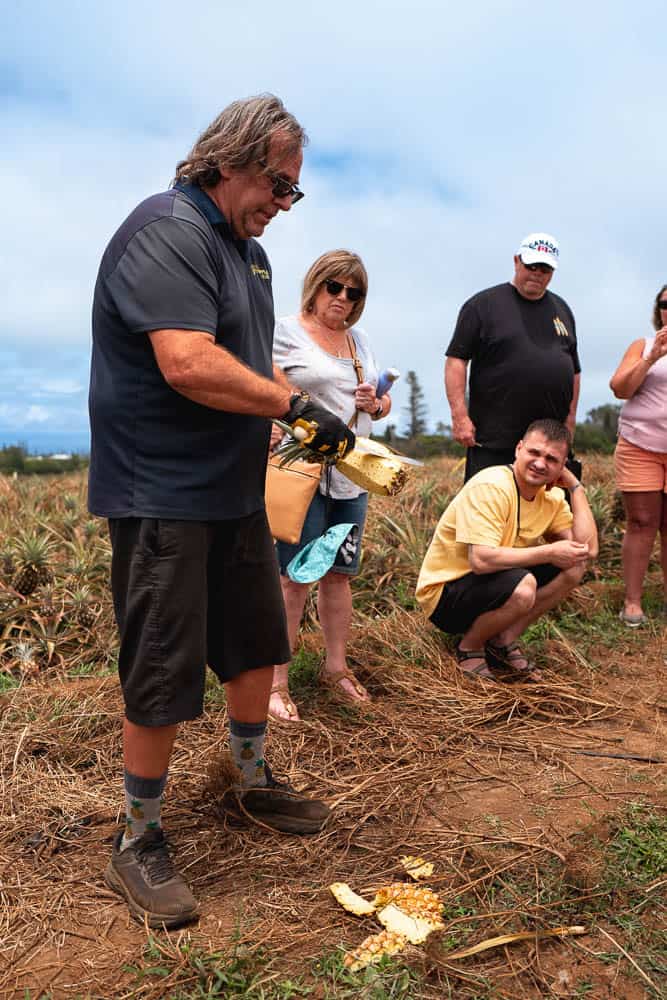
We were impressed with our guide’s knife skills as he deftly cut each pineapple and distributed each piece individually.
Maui Gold sorting facility tour
After our taste buds were satisfied, we boarded the bus once again to depart the pineapple fields.
The bus motored back to the farm road entrance, toward the farm’s pineapple plant. This is where the pineapples are brought after harvesting to be washed, sorted, and coated with an organic barrier to help keep the fruit as fresh as possible before consumption.
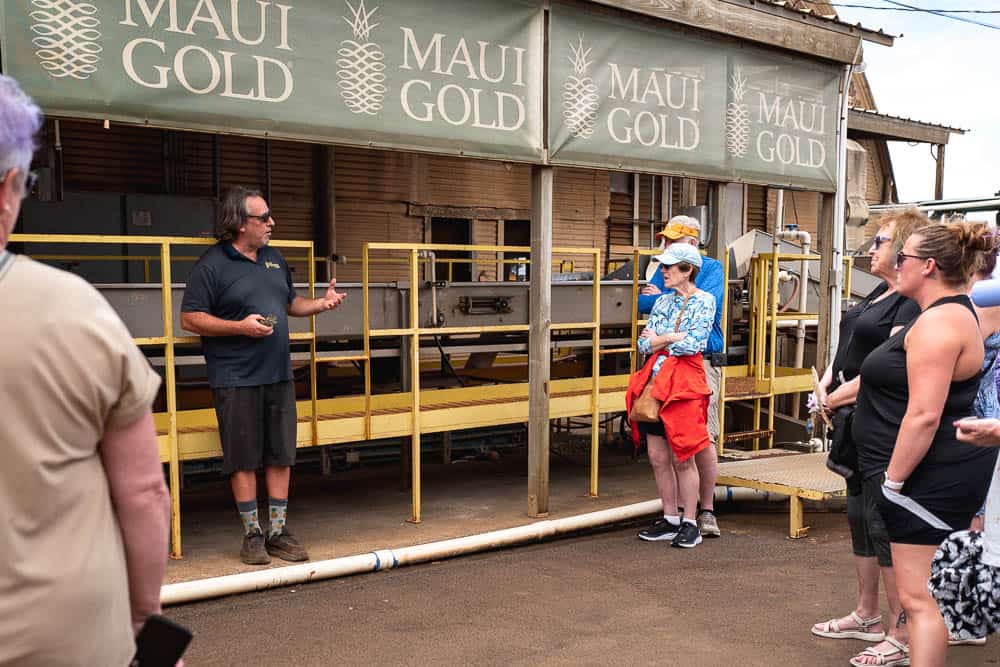
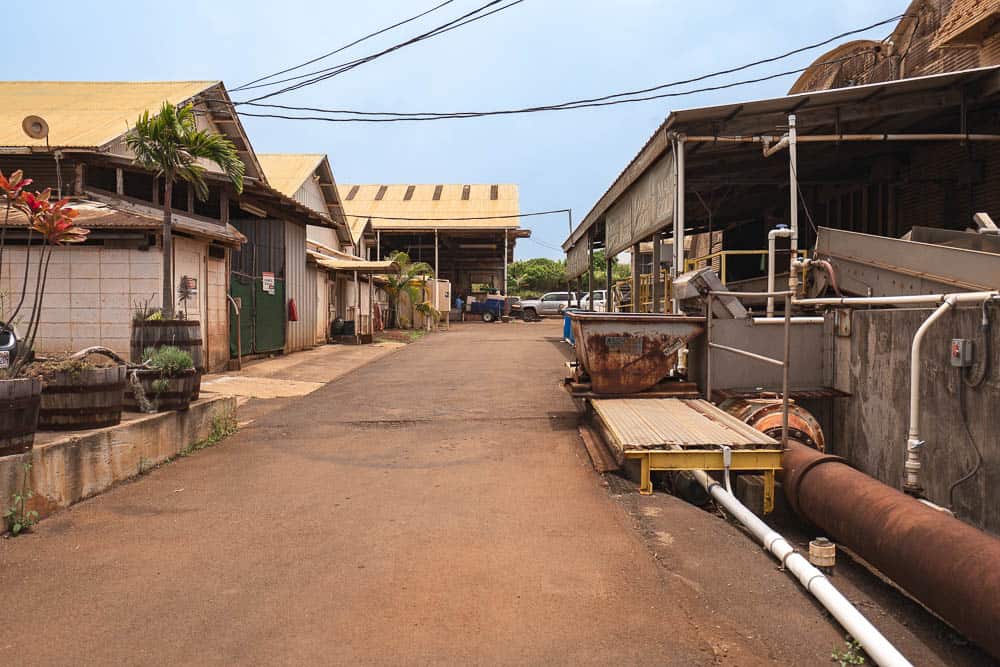
If you’re lucky, you’ll be asked to don a bouffant hair cap to watch pineapple being processed firsthand. Unfortunately for us, pineapples weren’t being processed on the day of our tour — while our guide pointed out the machinery to us, we weren’t able to watch the processing plant in action.
After a brief tour of the pineapple plant, our guide invited us into the open air facility to pick up our complimentary pineapples — conveniently boxed for easy transport. We were given one pineapple per person, or one box of two pineapples per couple.
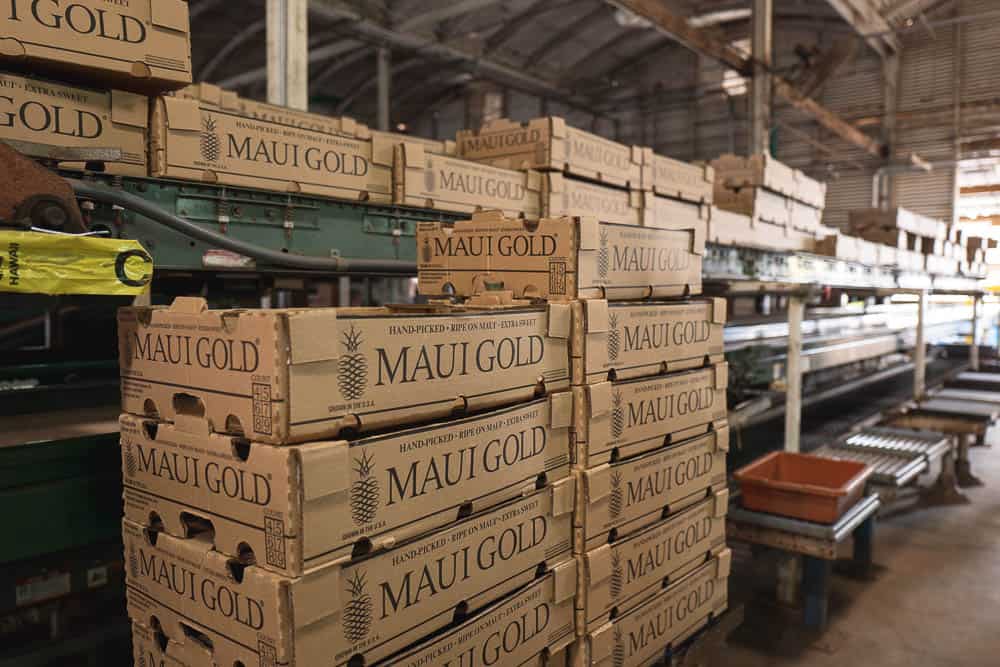
With pineapples in hand, our group loaded back onto the bus for the short drive back to the check-in desk at the Hali’imaile Distillery. Our tour concluded once we de-boarded the bus.
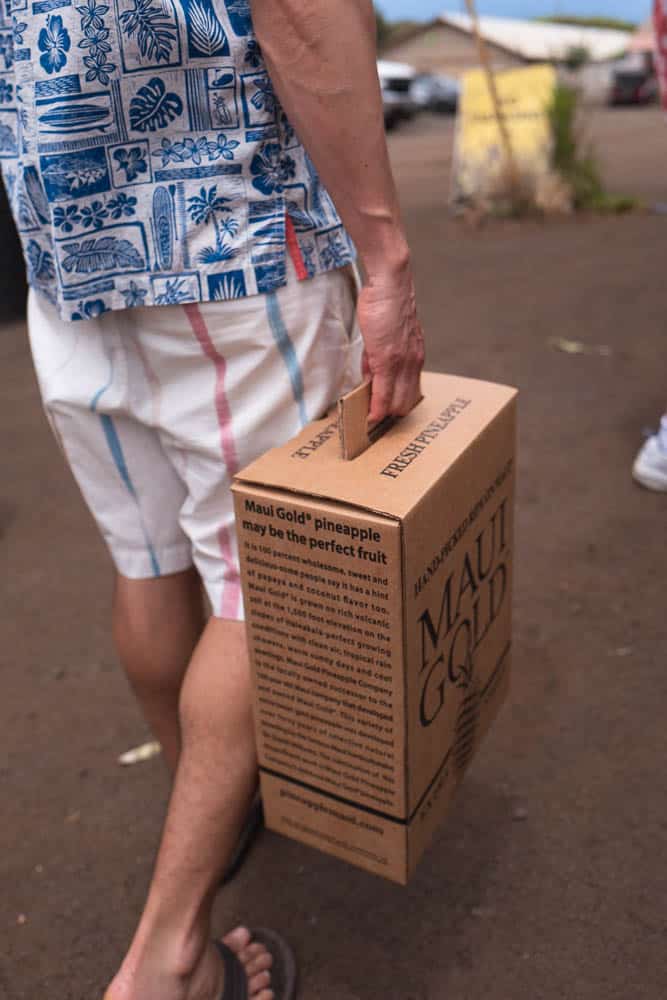
Our thoughts on the Maui Gold Pineapple Tour
While we’re typically not fans of bus tours (we prefer more time spent outdoors), it was exciting to see and stand in a place with such historical significance. With its ties to Hawaii’s old pineapple industry, Maui Gold farm is the last vestige of the islands’ once prominent commercial pineapple trade.
One benefit of a bus tour is that those who can’t walk long distances will be able to see the farm comfortably. We never ventured far from the bus. However, the tour isn’t wheelchair accessible. You’ll need to be able to climb some stairs onto the bus, as well as at the pineapple factory.
I was disappointed that we weren’t able to see the pineapple sorting plant in action, but I also realize that pineapple harvesting and sorting doesn’t happen every day. If experiencing that portion of the tour is important to you, I recommend contacting Maui Gold Pineapple Tours to find out which dates you’re most likely to see activity at the sorting plant.
Overall, we enjoyed learning about pineapple farming and getting an up close look at fruit that would eventually make it to local Maui markets. Pineapple tasting in the field was also a highlight for us.
Pineapple tour FAQs
What should I wear while on the pineapple tour?
While the tour bus has air conditioning, you’ll be making stops and standing outside without shade for segments of the pineapple tour.
We recommend that you wear a hat, sunglasses and sunscreen, along with light layers. It can feel cooler at times due to the farm’s Upcountry climate. When we left our lodgings in Khei, it was sunny and warm. But there was a light rain and scattered clouds when we reached the Maui Gold farm.
The tour company recommends wearing closed toed shoes, as you’ll be spending some time in the field among the pineapple plants.
What should I bring to the pineapple tour?
The emailed tour instructions we received recommended bringing sunscreen, a hat, and bug spray. We opted against spraying insect repellent on ourselves, and we didn’t notice any bugs while on the tour.
However, carrying a hat and sunscreen is always a good idea for sun protection on Maui. So is water. While the bus is air conditioned, you’ll be standing in an unshaded field while on the farm.
Otherwise, the only thing you really need to bring is a copy of your tour tickets.
Where can I park?
There’s plenty of free parking in a large lot next to the check-in area. Maui Gold shares the parking lot with the Hali’imaile Distillery Company and a neighboring glass workshop.
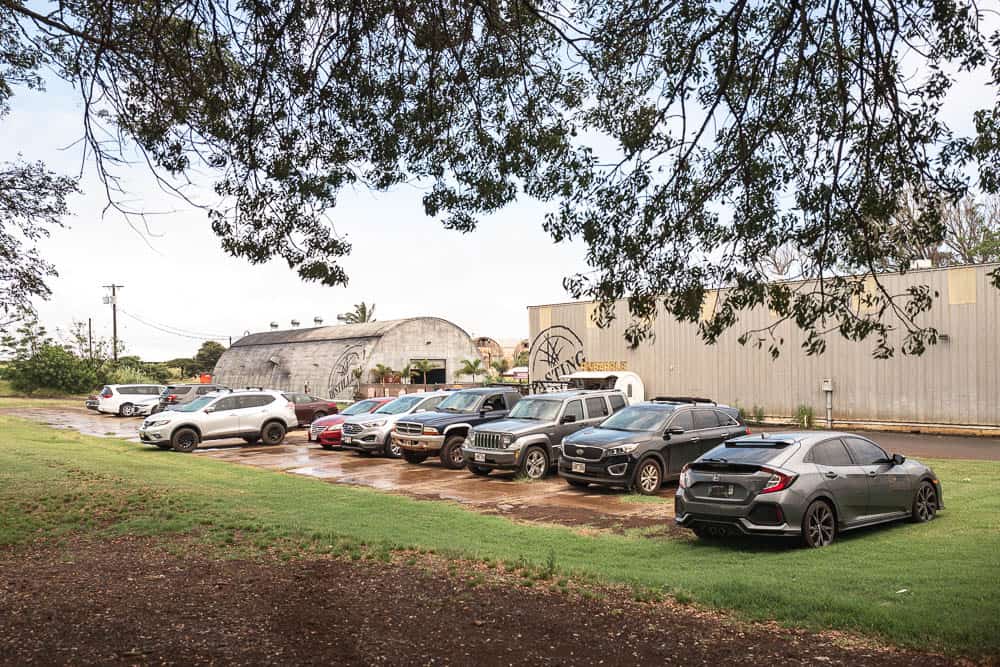
Do you need to book the Maui Gold pineapple tour in advance?
Yes, your best bet is to book the tour in advance — especially if you’re traveling with a group. We spotted a group of three women attempting to sign up for a same-day tour while we were waiting for our bus. Unfortunately, the tours for the rest of the day were completely sold out.
So while you could sign up for a same-day tour in person, you’d find yourself disappointed if there aren’t any available spots left.
What is the tour cancellation policy?
The tour allows for free cancellation up to 24 hours prior to the tour.
A friend who had planned to accompany us on the pineapple tour had a last-minute conflict and had to cancel her ticket. It was a simple process: the confirmation email from Maui Gold had a link to change or cancel the tour ticket. With just a few clicks of the mouse, she had canceled her ticket and initiated a refund to her credit card.
Bottom line
If you’re like us and can’t get enough of farm tours on Maui — or you just want to see a working pineapple farm in Hawaii — consider visiting the Maui Gold pineapple farm. You won’t get a flashy train ride or see a pineapple maze, like you’d find at Oahuʻs Dole Plantation experience — but you WILL gain an authentic look at what a modern day commercial pineapple farm looks like.
And the souvenir Maui Gold pineapple makes the tour an even sweeter experience.
